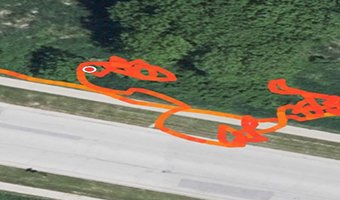‘I never felt my life was threatened the way it was with the stroke’
Dennis Blasius, 65, was on a routine six-mile run this spring when something changed.
![]()
"Two miles in, I suddenly started seeing double, the world was tilting, and I couldn’t continue," he said.
A driver noticed him in distress and stopped to ask if he needed help. Blasius tried to wave him off but the driver stayed as Blasius called his wife, using his smart watch.
When his wife arrived, she saw that her husband’s mouth was drooping and he could not move the right side of his body. She knew something was not right and took immediate action.
The former law enforcement professional had experienced a stroke. He was unable to walk in a line or discern what was happening to him. The GPS tracker on his smart watch captured his erratic path, shown in the image below.
"At some point, a blood clot in my thalamus kept my brain from sending directions to the right side of my body, spinning me in never-ending circles," Blasius said. "I have no recollection of any of this."
He was seen in the emergency department at ProHealth Waukesha Memorial Hospital. Imaging of his brain quickly helped determine that he was eligible for an injection of tPA — blood-clot-busting tissue plasminogen activator.
"It powered through the clot and allowed me to recover quickly," Blasius said. "Soon enough, almost magically, I got my strength back. I could walk, I could talk, my mental acuity came back."
Blasius spent one night in the intensive care unit and was released to recover at home in Waukesha. To help prevent the risk of another stroke, he now takes blood-thinning medication and baby aspirin. He is also taking life a little slower, knowing his risk for another stroke is highest over the next 12 months.
He is still stunned to think that he had a stroke. He takes care of his health and runs most days.

The GPS tracker on Blasius's smart watch captured his erratic path, shown in the image above.
"I’ve thought of myself as the person who runs in and helps other people get out of trouble," he said. "I never felt my life was threatened the way it was with the stroke. It was shocking to me."
Blasius retired five years ago and is now a leadership consultant. He has returned to work but finds that he can tire and lose his sense of concentration, especially after using the computer and leading virtual meetings.
He is also running again under medical guidance, and has even been cleared to ride his motorcycle.
Blasius has been told that his stroke may have been caused by a small piece of tissue in his artery that broke loose and traveled to his brain. He now wants to tell others that anyone can experience a stroke, no matter their age or level of fitness and health. He does not have heart disease or high cholesterol, and manages his blood pressure. He rarely drinks alcohol and maintains a healthy weight.
Blasius is sharing his story to encourage people to get treatment early, at the onset of stroke symptoms, as time is critical. He also wants to increase awareness of the warning signs of stroke. The Wisconsin Coverdell Stroke Program recommends using the letters BE FAST to spot a stroke:
- Balance: Sudden loss of coordination or balance.
- Eyes: Sudden change in vision.
- Face: Sudden weakness on one side or facial droop.
- Arm: Sudden arm or leg weakness or numbness.
- Speech: Sudden slurred speech, trouble speaking or trouble understanding speech.
- Terrible headache: Sudden onset of a terrible headache.
Looking back, Blasius realizes fast action contributed to his positive outcome. When his wife arrived, he wanted her to take him home so he could take a nap. Things may have ended very differently if she had agreed.
Blasius’ reluctance to accept help can be typical of people experiencing a critical health event. At the time of his stroke, he told the driver who stopped to help him to continue on his way. He also wanted to get up and walk when he first awoke in the ICU.
"It’s a matter of denial. Everybody will say, I don’t have a problem," said Mark Schultz, DO, medical director for emergency medical services at ProHealth Waukesha Memorial Hospital. "Every day we see people having a medical situation who need someone else to convince them to seek help. Be attentive to and aware of warning signs for critical illness. If you recognize that someone is not acting normally, seek help. In these situations, even a stranger may need to be an advocate."
While he could not readily accept help at first, Blasius knows the actions of others allowed him to survive a life-threatening stroke.
"It’s a reminder to truly enjoy every day, because you don’t know what life holds for you in the future," he said.